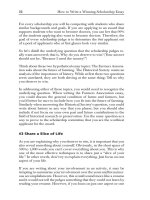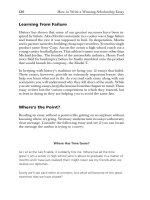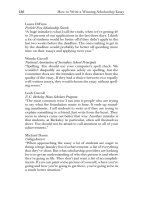How to write a cover letter and a follow up letter and create a winning portfolio
Bạn đang xem bản rút gọn của tài liệu. Xem và tải ngay bản đầy đủ của tài liệu tại đây (55.52 KB, 8 trang )
How to Write A Cover Letter and A Follow-up Letter, and Create A
Winning Portfolio
A cover letter is like the icing of a cake or a movie poster.
Basically, it aims to tease potential employers and to give them an engaging reason to read through your resume.
Remember that there are millions of job seekers out there, and to catch an employer’s eyes is a critical step in
surviving a highly competitive field.
The cover letter is not merely a summary or mirror of your resume, but an opportunity to build connection with
your potential employer by personalizing the letter and revealing your style and tone in communicating.
Aside from an attractive cover letter and a solid resume, applicants go through the process of waiting, which is
quite a luxury nowadays for those who urgently need jobs. Applicants can send follow-up letters to companies
they are applying for, but they must do so with utmost courtesy. Sometimes, accompanying the cover letter and
resume is a portfolio especially for industries that require heavy creative and technical work, like architecture,
graphic design, and writing.
This guide will look into the steps, techniques, and tricks in coming up with an appealing yet professional:
cover letter
follow-up letters
portfolio
What is A Cover Letter
According to Yale College, a cover letter serves as a personal introduction to a prospective employer showing
why you are interested in the position and the organization and justifying why you qualify for the position. The
letter should match what the job description is saying by emphasizing two or three strongest reasons why you are
a good candidate for the role.
How to Create An Engaging Cover Letter: The Characteristics
Length. The Harvard Law School website states that a cover letter should be one page only. It should have four to
five paragraphs, with a font size of 11 or 12 and margins at 1-inch on all sides
Paper Quality and Size. The Adams Cover Letter Almanac stresses that the standard size of a cover letter should
be 8 1/2-by-11 inch since other papers beyond this measurement might get lost in an employer’s file cabinet. The
regular office papers may work for most positions, but executives and top-level positions are expected to deliver
more expensive stationery papers, such as ivory laid.
Tone. Accoridng to Harvard, the cover letter should be treated like a “one-sided interview,” like a conversation
about work with a colleague. The tone of the cover letter remains professional but gives a glimpse of your
individuality. It reveals how you speak or how you convey your desire or thoughts in a formal occasion.
The Structure of A Typical Cover Letter
Address. The return address and contact number at the top right-hand corner should appear without your name. It
should also avoid abbreviations. The date can be placed two lines beneath the address and should not be
abbreviated.
Salutation. Using “To Whom It May Concern” is not encouraged for applicants. One is advised by experts to find
out the name and position of the addressee, and confirm these details. Placed two lines beneath the
address/date, the salutation can start with “Dear Mr.” or “Dear. Ms.” followed with the person’s last name and a
colon.
For advertisements with no enough information and when all efforts to find out the name fail, you can use “Dear
Hiring Manager,” “Dear Hiring Coordinator,” or simply “Good Morning.”
First Paragraph. Based on the book Business Communication: In Person, In Print, Online by Amy Newman and
Scot Ober, the opening paragraph must be straightforward as employers expect only quality applications for the
position. Hence, it has to state:
1. the reason for your letter
2. the position you are applying for
3. how you learned about the opening
The authors note that you can style your first few sentences based on your industry. For example, restrained
expressions are for conservative industries, such as financial services, and something imaginative for creative
industries like advertising and public relations.
Take a look at the book’s example:
Dear Ms. Diaz,
For two years, I’ve been hoping Young and Rubicam would visit the Fullerton campus, so I was excited to
see the summer position posting for Public Relations Assistant. From my PR coursework and PR
experience, I’m confident that I have the strong written and oral communication skills you require for the
position.
As you can see, this is personalized but still professional and has all the necessary elements of a cover letter’s
introduction.
Body Paragraphs. The Harvard site claims that these paragraphs should establish the work experiences that
directly match the requirements the position is requiring. It should explain “your background and includes why you
are seeking work with this particular employer.” It has to clearly show why your skills meet the company’s needs,
and make the connections very specific.
To deliver specific details, Newman and Ober wrote that an applicant can give an example of that connection.
Such example should manifest modest confidence and not a sales approach. Here are some of their examples:
Not: As stated on my resume, I sometimes went on sales calls.
But: Once, I went on a sales call with the president of Scholastic, Inc.’s Education division, and we closed a
$150,000 deal—the largest for the Ugo software product. From observing the sales manager, I learned…
Not: I took a class in business communication.
But: The communication strategies I learned in my business communication class will help me resolve customer
issues as a customer service representative at Allegheny Industries.
If you are to come up with two body paragraphs, the Cover Letter Alamanac suggests the following structure:
Second Paragraph – Mention what you want to contribute to the company and how you can be an asset with your
qualifications. You can also discuss your skills and how they go with the job requirements.
Example: In addition to my strong background in mathematics, I also offer significant business experience,
having worked in a data processing firm, a bookstore, and a restaurant. I am sure that my courses in
statistics and computer programming would prove particularly useful in the position of Trainee.
Third Paragraph – Explain why you choose the company. You can touch on what you know about it (your
research effort) and how familiar you are with the industry. Expressing your enthusiasm will help make your cover
letter more appealing.
Example: I am attracted to City Bank by your recent rapid growth and the superior reputation of your
economic research department. After studying the different commercial banks, I have concluded that City
Bank will be in a strong competitive position to benefit from upcoming changes in the industry, such as the
phasing out of Regulation Q.
In essence, after reading the body paragraphs, the employer should realize what the applicant can bring to the
position and to the company.
Closing Paragraph. This is where you are supposed to thank the employer. Newman and Ober stress that the last
paragraph should mention the applicant’s phone number and email address. The applicant is expected to
express flexibility in terms of schedule and location. Here are their examples:
After you have reviewed my qualifications, I would appreciate your letting me know when we can meet to
discuss my employment with Connecticut Power and Light. I will be in the Hartford area from December
16 through January 4 and could come to your office at any time that is convenient for you.
When you feel like the company is receiving too many resumes, you can take a more proactive approach:
I will call your office next week to see whether we can arrange a meeting to discuss my qualifications for
the financial analyst position.
As for the closing line, one can use “sincerely.”
Bonus Tips
Use powerful language. Avoid flooding your letter with too technical or jargon-heavy language to impress the
employer. This will be found in your resume and is useful when you become part of the company already. Right
now, you are focused on showing your personality as an applicant and desirable employee. You can use action
words to make the cover letter “alive.” Here are links to examples of those action words and phrases:
5 Phrases to Use in Your Cover Letter to Land An Interview
Cover Letter Key Phrases
Cover Letter Catch Phrases
Do not mention your desired salary right away. Unless the advertisement requires it, you can forget your concern
about the salary. If it asks for an amount, give a range instead of an exact number. You can also note that it is
negotiable.
Avoid sounding informal and focus on being specific and concrete. Accoridng to the Adams Almanac, one should
avoid comparisons or cliches like “I am a smart as a whip” or “Your company is known as the creme de la creme
of accounting firms.” Avoid using hot pink papers, sharing personal anecdotes such as how you found the
advertisement while you were taking your dog for a walk, or talking about shortcomings and how desperate you
are for the job. There is a proper venue for those personal details. Keep your cover letter focused on your
qualifications and the job’s requirements.
How to Compose Follow-up Letters
There are four types of follow-up correspondence according to the University of Washington:
Thank-You Letter. This is given after a telephone conversation or face-to-face interview. The applicant should
express appreciation about the time the company shared with him and the opportunity to further discuss his
application. Here is a sample thank-you letter from Adams:
Dear Ms. Cummings,
It was a pleasure speaking with you today in connection with your search for a Department Manager. I feel
my experience and achievements are well within the required qualifications set forth in your detailed job
description, and I am confident of my ability to provide your department with the same dedication and
capability as I exercise in my present position.
As outlined in my resume, I have extensive administrative and fiscal management experience working with
all departments on nonmedical aspects in a health care environment. The challenges associated with the
above position are of great interest to me ad I would like the opportunity to meet with you, at your
convenience, to further discuss my candidacy for this position.
Yours sincerely,
Chris Smith
Declining Offer Letter. Sometimes, we are hesitant to say “no” to job offers. But we need to respond to them
because in the future, your paths may cross and the networking aspect may be beneficial for both of you. Here’s
an example from the Adams Alamanac:
Dear Dr.Lodge,
I received your letter dated May 8, offering me the Dental Hygienist position at Angle Dental Center. The
compensation and benefits of the position sound very interesting, and I am confident I would enjoy
working with your staff.
However, shortly before receiving your letter, I was offered, and accepted, another position. Thank you for
your time and consideration of my candidacy.
Best wishes,
Clarissse Lim
Response to A Rejection Letter. Rejections happen because they are teaching you something or leading you
closer to the work that is for you. To keep the connection and show sincerity, you can ask the company to
consider you for future openings.
Dear Ms. Cooper,
Again, thank you for meeting with me last week to discuss the opportunities for Architects at Edge Firm. I
admire the innovative work you and your staff produce and, although I was not chosen for the position, I
would like to be considered for upcoming projects.
I have enclosed an additional copy of my resume for your files. Thank you for your attension and I hope to
hear from you in the near future.
Sincerely,
Archie Smith
Acceptance Letter. This kind of letter acknowledges and confirms the job offer (the tasks, the payment, and the
schedule). This may also attest your solid work ethic.
Dear Sir Lodge,
I am grateful for the opportunity to be part of such an esteemed department in the agency. I look forward
to assuming my post as Geographer, and I am happy to accept the terms of our agreement.
As discussed, my graduation date is set for May 31, and I will be available to begin the following Monday,
June 13. I will contact your office early next week to schedule my training session.
Again, thank you. I am very excited to begin.
Sincerely,
Lisa Myers
Here are other examples of cover and follow-up letters:
Sample Thank-You Note
Sample Thank-You/Follow-up Letter
Sample Cover Letters
Steps on How to Create A Portfolio
Your career portfolio is the compilation of your actual works. This may be used by a potential employer to assess
the level of your talent, knowledge, and motivation. It is actually a more visual “marketing tool” for your
accomplishments and ability. This will give prospective companies ideas on the kind of work you can give them.
The website of the Rivier University in New Hampshire lists the items you may include in your portfolio:
Professional Growth and Career Planning
Outstanding work in your major
Internship experience
Professional memberships
Job shadowing/Informational interviews
Job descriptions/performance appraisals/work projects
Professor evaluations
College transcript
Academic or professional awards
Communication
Speeches/Oral Presentations
Papers/written work
Debates
Articles written/published
Business letters/correspondence
Marketing materials
Sales/customer service experience
Creativity
Creative Writing Samples
Art Work – drawing, painting, images
Photography
Theatre experience
Personal experience in another culture
Study of another culture
Foreign Languages
Innovative, imaginative or creative ideas
Designing materials or projects
Critical Thinking and Research
Numeric work from coursework or professional experience
Research papers/projects
Case studies
Care plans
Critical analysis papers
Critiques of research articles
Leadership and Teamwork
Clubs/Campus activities
Athletics
Academic group projects
Leadership roles
Community projects
Volunteer activities
Work or internship roles
Active committee member or officer
Social Responsibility
Community outreach programs
Fundraising events
Community service events
Multi-cultural awareness projects
Campus ministry work
Community building
Care giving
Service Learning
Technical and Scientific
Power Point presentations
Excel spreadsheets
Access databases
Publisher (brochures, flyers)
Computer hardware/software experience
Web page design/programming
Internet research
Laboratory work
Scientific reports
Clinical skills
Others:
Extensive/Unique Travel
Special Hobby
Participation in a unique group
Organizational memberships
Licenses/Certifications
Study Abroad
Life Management Skills – time management, record keeping, managing, budgets or finances, etc.
Resume, Letters, Credentials
Resume
Letters of recommendation
List of references
Dean’s List letter
Nomination letters
Performance evaluation
Letter of acceptance into graduate school
Letter commending your skills
The Florida State University presents a list of specific materials you can add to your portfolio:
Education
1. Statement of teaching philosophy (1-2 pages)
2. Teaching honors/awards
3. Evaluations (e.g., supervisor, student)
4. Video of your teaching
5. Evidence of student learning (e.g., graded
6. exams, assignments [1 good/1 bad])
7. Classroom innovations (e.g., new technology)
8. Sample lesson plans
9. Relevant photographs
The Arts / Performance or Design
1. Actual work samples or photos of them
2. Video/audio recording of work
3. Course descriptions for classes/workshops
4. List of competencies mastered
Here are links to sample portfolios that can serve as your guide:
Education Portfolio
Occupational Therapy
Sample Digital Portfolios (bottom-right of the page)
Clinical Scientists Portfolios
Ten Creative Online Portfolios
Bonus tips: As much as possible, your accomplishments should involve problems and then the solutions you
formulated and executed alone or with a team. Keep your portfolio neat and readable. Lastly, make sure that it will
bring out your true style, the one they can expect and help you grow.
Stay on top of your writing! Download our grammar guide from www.englishgrammar.org to stay up-to-date.
Powered by TCPDF (www.tcpdf.org)









